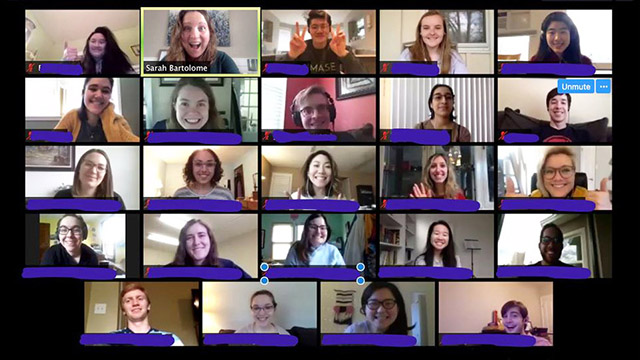Northwestern University’s Spring Quarter is up and running in the era of COVID-19 with courses being taught remotely on Zoom and other platforms — introducing many faculty and students to the world of Internet teaching technologies and the distance-learning experience.
The speed with which Northwestern and other universities have transitioned to remote learning is remarkable, and it comes with extraordinary opportunities as well as challenges. They include a variety of academic policies that range from rules on recording class sessions and financial aid for those needing technology resources to extending the deadline to drop a class for Spring Quarter and a decision to move all undergraduates to Pass/No Pass grading for the quarter.
“I have been amazed by the creativity and energy with which faculty and staff have transformed the College’s spring curriculum of about 700 courses so that we can offer the very best educational experience possible,” said Weinberg College of Arts and Sciences Dean Adrian Randolph. “While we are all looking forward to returning to non-remote instruction, I am gratified by the positive and flexible responses to the challenges we face across the arts, humanities, social and natural sciences."
The University maintains its high academic expectations and commitment to rigor for Spring Quarter as it manages Northwestern’s response to the threat of the coronavirus. The guiding principle in making many of these changes has been “to protect those impacted by the COVID-19 crisis, recognizing that we do not yet know the full scope of its impact on all members of our community,” according to letters to students from the Office of the Provost.
I have been amazed by the creativity and energy with which faculty and staff have transformed the College’s spring curriculum.”
Dean of the Weinberg College of Arts and Sciences
Many members of the Northwestern community welcome and support the changes, given the deadly spread of COVID-19 around the nation and world. Some undergraduate students have questioned the decision to offer exclusively Pass/No Pass grading, preferring a letter grade in some cases, because of plans to apply to graduate or professional school.
Peer institutions ranging from Stanford, Johns Hopkins and Harvard universities to Dartmouth College and others all have moved this spring to exclusively Pass/No Pass systems, or their equivalent. At Northwestern the decision to go to Pass/No Pass was made in part because it was seen as more equitable for all.
For example, some institutions like Harvard Medical School will consider Pass grades during this period if it is the only option available to undergraduate students. If both letter grades and Pass/No Pass are allowed at an individual school during this time, Harvard said letter grades would be preferred for applicants. So going to an optional situation could put Northwestern students at a disadvantage.
“While not all medical or other health professions schools and programs have stated how they will handle Pass/No Pass grades, many have already indicated they will honor this approach, given the current circumstances,” said Dr. José Ramón Fernández-Peña, director of the Office of Health Professions Advising at Northwestern and president elect of the American Public Health Association.
“The impact of this pandemic will be broad and will affect different communities in different ways,” he said. “The Pass/No Pass grading policy strives to mitigate this effect."
“We do not know what will come in the days and weeks ahead. It is clear, however, that things may get worse before they improve,” Dean Randolph said. “Acknowledging this, the Provost, in consultation with the deans, took several decisions that aimed at stabilizing our curriculum, while offering faculty, staff and students flexibility that might help us in the difficult days and weeks to come. The simplified grading scheme of Pass/No Pass is intended to provide our community with the greatest flexibility to account for the known and unknown challenges we may face.”
The changes in academic polices were made with broad input from across the University, including discussions and collaboration with faculty leaders.
"This pandemic has significantly disrupted everyone’s plans, and as University leaders, my team and I are called on to make difficult choices in the midst of these ever-changing, unprecedented circumstances,” said Interim Provost KathleenHagerty. “There is no choice, not even maintaining the status quo, that preserves best-case scenarios for all students, but we have done our best to consider all ideas, carefully gather feedback and make equitable, compassionate decisions, understanding that the health and well-being of our community will evolve over the Spring Quarter.”


